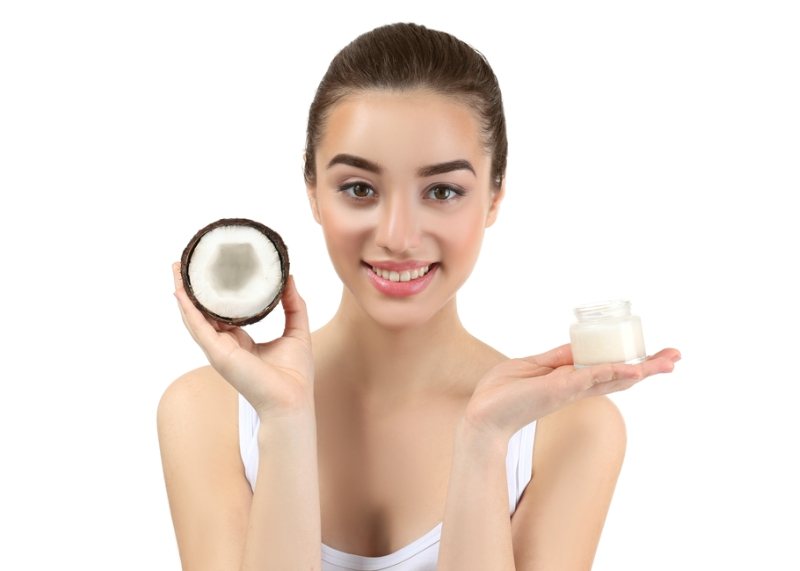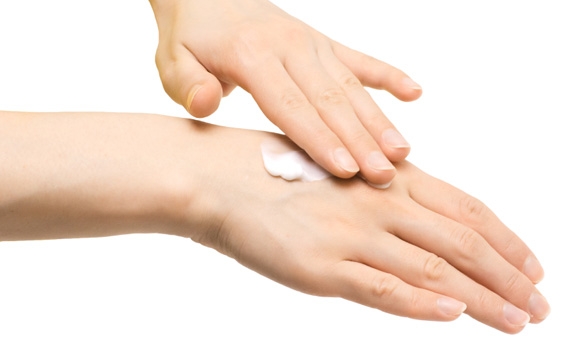Coconut oil is on the list of “versatile miracle cures” for many. This is because coconut oil can be used for many purposes, including cooking and personal care. For example, did you know that coconut oil is ideal as a lip balm or after-sun lotion?
What Is Coconut Oil?
Coconut oil is a fat extracted from coconuts. The coconut is opened, and the oil is squeezed out. This is done by heating the coconut meat at low temperatures. Two-thirds of the coconut meat consists of coconut oil/fat. It is best to buy natural, “pure” coconut oil with no added chemicals, flavors, or artificial colors.

Why Is Coconut Oil Good for the Skin?
Coconut oil contains three important nutrients for the skin. They are lauric acid, caprylic acid, and vitamin E.
Lauric acid: effective against bacteria
Caprylic acid: antioxidant that nourishes the skin and prevents skin irritation
Vitamin E: for skin burns, cell damage, and pigmentation spots.
In addition, the majority of coconut oil is made up of healthy saturated fatty acids. When these fats penetrate the pores, they moisturize the skin. Moisturized skin looks smooth, soft, and beautiful.
Coconut Oil Is Good for Acne
Coconut oil effectively controls acne, mainly due to its component lauric acid. This helps repair skin tissue, remove dead skin cells, and moisturize dry patches of skin.
Here’s how you apply it for acne:
First, steam your face so that the pores are open. Then, you need to apply a tablespoon of coconut oil to your skin in a circular motion. After allowing the coconut oil to soak in for a while, use a natural soap to remove oil, residue, and grease from the skin. Before following this step-by-step plan, it is wise to first test on a small piece of skin regarding allergic reactions.

Coconut Oil Has Anti-inflammatory Properties
Coconut oil has proven to have anti-inflammatory properties. Chronic inflammation is a part of various skin diseases, including different types of eczema, psoriasis, and contact dermatitis. Coconut oil can help soothe these various skin problems with the components lauric acid and caprylic acid, which have antibacterial, bactericidal, and fungicidal properties.
For the same reason, coconut oil is often used when suffering from skin irritations such as itching, red patches, and dry patches.
Coconut Oil Also Acts as a Makeup Remover
Are you looking for a natural makeup remover? Experiment with coconut oil. Dip a damp cloth in the oil and carefully remove any remaining makeup from your face. Thanks to the oily structure of coconut oil, makeup is easily removed, and skin is immediately moisturized. Coconut oil is also used as a night cream, thus killing two birds with one stone!

Coconut Oil Can Be Used as a Scrub
Coconut oil does not have an inherently abrasive/scrubbing effect, but it can be transformed very quickly. For example, coconut oil can be mixed with a small amount of sugar. This creates a natural scrub that can be used all over the body! Are you dissatisfied with the scent of homemade scrubs? Then consider transforming the smell in some way, such as adding a few drops of essential oil.
Coconut Oil Is Great as Hand and Foot Creams
This application also owes much to the moisturizing effect of coconut oil. When coconut oil is applied to the hands and feet, they become silky soft. Cuticles become beautifully smooth, and minor wounds around the fingers and toes heal faster. Some beauticians also claim that coconut encourages nail growth; no official proof has been found yet, however. You can give it a try and see!

Do you use coconut oil in your skincare routine? Let us know in the comments below!



